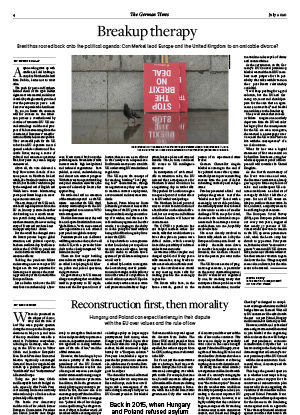Hungary, Poland, and the battle over democracy
Where do you stand on the subject of democracy and the rule of law? This was a popular question during the run-up to the European elections in May 2019, and none of the top candidates was able to avoid it. Politicians everywhere, including in Germany, were calling on the EU to rein in Viktor Orbán and Jarosław Kaczyński. Even French President Emmanuel Macron vigorously encouraged German Chancellor Angela Merkel to take up a position against the “anti-liberals” and “authoritarians” in Eastern Europe.
Today, one year later, Orbán and Kaczyński haven’t budged an inch, especially after Polish President Andrzej Duda was narrowly reelected on July 12. Duda is a close political ally of Kaczyński.
The battle over democracy and the rule of law, which former European Commission President Jean-Claude Juncker once fought with notable verve, has clearly lost momentum under his successor, Ursula von der Leyen. The CDU politician let herself be nominated with votes from Orbán and Kaczyński and has been handling the Eastern Europeans with kid gloves ever since. The German presidency of the EU Council is unlikely to change that.
On the agenda for the coming six months, Hungary and Poland are not mentioned at all – in spite of the ongoing investigations into breaches of EU values and the rule of law by governments in Warsaw and Budapest. Germany’s government has expressed its commitment to defending the shared values of the EU: “We will […] work intensively to strengthen fundamental values and particularly to promote a common, cooperative and constructive approach to dealing with the issue of the rule of law,” read the official statement.
However, this handling is by no means a priority of the German presidency of the EU Council. The announcement was but one of many, and was even issued after similar statements focusing on agriculture and consumer protection. In addition, the Berlin government avoids pillorying any country in particular. In fact, the new idea is to encourage not just Poland and Hungary, but all 27 EU states to engage in a “political rule-of-law dialogue on an equal footing,” as the government draft put it. In other words, all members will be encouraged to put themselves to the test.
Even the linking of EU financial aid to the promotion of democracy and the rule of law – something Berlin has been requesting for ages – is suddenly no longer very important. Germany is indeed still supporting the corresponding proposal issued by the European Commission, but Merkel is clearly reluctant to campaign for the proposal on a grand scale. A quick passage of the new EU budget has the utmost priority, and no one wants to jeopardize this much-needed agreement by digging into the pockets of Hungary or Poland.
Even the theme of asylum law reform and fair burden-sharing among member states as part of official refugee policy no longer enjoys priority status. Back in 2015, when Hungary and Poland dug in their heels and refused to accept asylum seekers, Merkel continued to fight bravely for a “European solution.” Five years later, Merkel is eager to pass the hot potato on to someone else, which means it’s now the European Commission’s turn to have a go at the subject.
The chancellor has indeed burned her fingers a few too many times in Eastern Europe, and she is unwilling to risk a reemergence of the issue during Germany’s half-year as EU Council president. But Merkel is not the only one doing her best to avoid trouble; the acting CDU chairwoman Annegret Kramp-Karrenbauer is also pursuing a policy of appeasement. In the dispute over Fidesz in Hungary, she spoke out against excluding the party from the conservative European People’s Party (EPP). In other words, Orbán’s supporters in European Parliament are allowed to stay.
This decision has weakened the liberal and only moderately conservative Eastern Europeans in the EPP. Even EPP President Donald Tusk was not able to prevail against the directive from Berlin. The former EU Council president from Poland had called for Fidesz to be expelled, but without support from the CDU, nothing can move forward in the EPP.
But it’s not just the conservatives who are having a hard time with Eastern Europe; the Social Democrats are also struggling over which path to take. For example, for some time, Social Democratic colleagues in Brussels and Berlin resisted taking action against corruption in Romania, which has a Social Democratic government. Only after weeks of squabbling was the Romanian PSD suspended. That was more than a year ago, and things have gotten noticeably quiet with regard to Romania in the meantime. There is also little talk of Poland and Hungary these days in Brussels.
The EU has more important things to do in the COVID-19 era than to discipline its problem children in Eastern Europe. In fact, the EU has been forced to recognize that it actually has very few weapons – and blunt ones at that – to combat nepotism, the dismantling of democracy and the erasure of the rule of law on the continent. This fact was on display in particularly vivid color in the cases brought against Poland and Hungary, accusing them of breaching EU values and the rule of law; both cases have been completely ineffective at achieving anything close to the desired result.
In theory, the so-called Article-7 investigations could lead to the withdrawal of a country’s voting rights on the EU Council – a move referred to as “the nuclear option.” It means that the member state would lose the ability to participate in decision-making in the most important EU body. In practice, however, it is highly unlikely that this could ever happen, seeing as such far-reaching decisions must receive unanimous consent, and Poland and Hungary clearly have each other’s back in the matter.
For this reason, the Article-7 procedure has never moved beyond a non-binding hearing. And even this delicate diplomatic exercise proved to be counterproductive. The procedure looked like “an instrument used by the West to blackmail the East,” admitted State Minister for Europe Michael Roth (SPD) after an unproductive meeting. Although “this is by no means the case,” he noted, it nevertheless showed very clearly the limits of Article 7.
Even the new instrument devised by Roth and the Belgian EU Justice Commissioner Didier Reynders harbors no promise for resounding success; the “Fundamental Values Check-up” is designed to complement existing mechanisms and build bridges between East and West. All 27 EU countries will be asked to take the test – not just Poland, Hungary and Romania, but Germany as well.
However, until then, all 27 heads of state and government will be invited to join Merkel at the negotiating table to discuss the new EU budget and post-pandemic economic reconstruction. Only after that – at least according to the finely chiseled dramaturgy that is Germany’s current presidency of the EU Council – will the discussion turn to fundamental values, democracy and the rule of law.
This begs the general question as to whether an attempt is being made to garner support for the controversial reconstruction plan in return for silence regarding the violations of the rule of law in Hungary and Poland. Franziska Brantner, European affairs spokesperson for the Greens in the Bundestag, warns against such an approach: “I fear that any financial sanctions against countries that breach the rule of law will ultimately turn out to be less severe than the European Commission had originally planned.”
One could also express the dilemma in more drastic terms: first comes food, then comes morality. In the era of COVID-19, this famous Bertolt Brecht dictum applies now more than ever. And this means that Eastern European states can count on leniency in the coming months.
Eric Bonse
is a political scientist and journalist. He works as an EU correspondent in Brussels.



